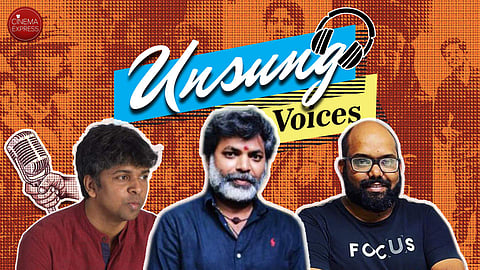

During the mid-2000s, a rather strange trend was picking up in Hindi television channels. For some reason, dubbed versions of Tamil and Telugu films—both hits and flops—found a dedicated audience, and stars like Allu Arjun, Mahesh Babu, Suriya, and Vijay began commanding adulation outside their States. That was perhaps the earliest sign of the ‘pan-Indian cinema’ trend that is all the rage now. Stars today appreciate the attention they get in non-local centres by putting in the effort of dubbing in multiple languages. Take, for instance, SS Rajamouli's RRR, which remains in public glare even six months after its release. The film’s Telugu superstars — Jr NTR and Ram Charan — dubbed for themselves in Hindi, Tamil, and Kannada, and this turned out to be highly beneficial for the film’s success.
Renowned Tamil lyricist-dubbing director-language trainer Madhan Karky shares that Rajamouli’s insistence that the actors dub for themselves in multiple languages reaped rewards. "I was hesitant about this idea initially and thought that voice artists comfortable in different languages would save time. However, I was overwhelmed by the commitment and determination of Jr NTR and Ram Charan," says Madhan, who also wrote the Tamil dialogues for the film. It helped that both Ram Charan and Jr NTR were already familiar with the basics of the Tamil language, having grown up in Chennai. "The idea of dubbing is to translate the right mood, emotion, and expression of the characters. Our job is to train them in dialect and pronunciation."
Voice artist and dubbing director RP Bala, known for dubbing big-ticket films like Mohanlal's National Award-winning film, Marakkar (2021), and the upcoming Prithviraj Sukumaran-starrer Gold, observes that even non-local audiences are familiar with the voices of such stars, due to the advent of social media. "Mohanlal found it quite easy to dub in Tamil for films like Pulimurugan and Lucifer, as he had to speak contemporary Tamil. However, he took more time when dubbing Marakkar, but never shirked from going for multiple takes. Manju Warrier also dubbed for the first time in Tamil for Marakkar." Bala, who calls Marakkar one of his most challenging projects, notes that training the actors to speak in old Tamil was a particularly difficult exercise. Madhan too claims to have faced similar challenges with RRR as the film is set in the 1920s and traverses through varied regions. "We chose a particular meter for the Tamil spoken in RRR. We just included minor variations to the usage by bringing in a Tribal accent, and sparingly using Hindi and English words to lend authenticity."
More than just translating the language, it’s often important to make new audiences relate to the content by making certain creative choices. For instance, Madhan, who worked on the Tamil dubbing for the Dulquer Salmaan-starrer Sita Ramam, talks about reinterpreting some straightforward Telugu dialogues as poetry in Tamil. “Dulquer, who had already completed the Telugu dubbing by then, gracefully accepted this challenge," says Madhan.
While it’s often big-ticket films that opt for dubbed releases across States, the success of a comparatively smaller, content-oriented film like Gargi has shown that this isn’t a one-way street. Sai Pallavi, who plays the titular role, dubbed in all three languages —Tamil, Telugu, and Kannada. Gargi's dubbing director AR Shaan reveals that Pallavi had never spoken Kannada before dubbing for the film and adds that she worked hard to pick up the language. "We wanted to ensure that the serious emotions of the film didn’t get diluted. There were some simple yet compelling dialogues in Tamil that hit the right chords and I wanted to give the same experience to the Kannada viewers as well. I took around four months to write the Kannada dialogues after watching the film around 20 times. During the dubbing session, I fixed a certain meter for Pallavi and ensured that she sounded like an average Bengaluru-based woman," says Shaan, adding that both the dubbing and dialogues received a lot of love from the Kannada audience.
Stressing the importance of understanding the musicality of each language, Madhan says that he even takes extra care to write dialogues for crowd voices. He points out that only urban audiences are used to the concept of subtitles, and that the majority of viewers across the country prefer dubbed films. "Dubbed films ensure that you don’t miss out on visual grammar—which could happen when you’re concentrating on subtitles."
Bala, who also helped Dulquer Salmaan with the Tamil and Telugu dubbing of Kurup, attributes the blockbuster success of the film to its multilingual release. "I recorded a dummy track with an artist whose voice is similar to Dulquer, so he could understand what we were looking at. For Telugu, he wrote the dialogues in Malayalam to get the pronunciation right. Malayalam actors tend to have a mild trace of their native accent when they speak in other languages, and I don’t see this as a problem as it retains originality. People also connect better when they feel that the voice is natural."
Given all the work that’s done by dubbing experts and language trainers, the lack of glamour associated with the job means that validation isn’t exactly forthcoming. However, Shaan's response succinctly sums it all up. "When actors receive plaudits for their dubbing in various languages, it feels like our achievement. It motivates us to get even better."